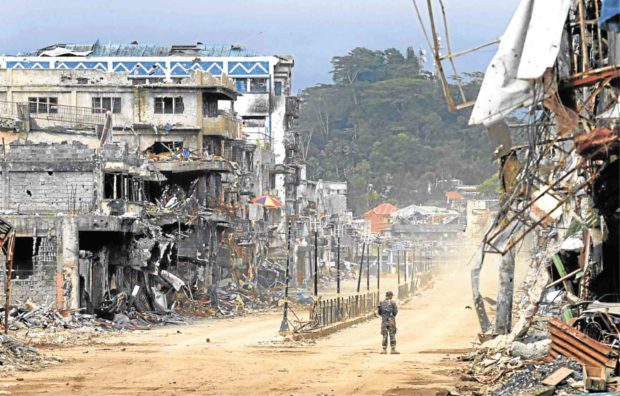
DESTRUCTION ALL AROUND Officials overseeing the rehabilitation of Marawi City following a five-month fighting between government troops and terrorists estimate that it will take years to complete the rebuilding of the Lanao del Sur provincial capital. —JEOFFREY MAITEM
COTABATO CITY — The Autonomous Region in Muslim Mindanao (ARMM) has earmarked P1.8 billion to fund the rehabilitation of Marawi City and provide livelihood to residents displaced by close to five months of fighting between the government and terrorists that ended here last month.
ARMM Vice Gov. Haroun Al-Rashid Lucman said the fund was apart from the money that the regional government had spent for the continuing relief operations for Marawi’s 260,000 displaced residents since May 23. So far, ARMM had spent nearly P1 billion for relief, he said.
ARMM Gov. Mujiv Hataman said a portion of the rehabilitation fund would come from the ARMM’s unused budget for 2017, amounting to P450 million.
He said the regional government had sought authorization from the Department of Budget and Management to use this fund for Marawi. Another P930 million from the ARMM’s 2018 budget would also be allocated for livelihood and rehabilitation efforts.
Some P100 million, taken from local taxes, had been earmarked to generate livelihood opportunities for Marawi residents under the “Special Marawi Fund,” Hataman said.
Lucman, who also headed the ARMM Crisis Committee for Marawi, admitted the fund would not be enough because the restoration or rebuilding of Marawi would entail a huge amount of money.
Marawi City Mayor Majul Usman Gandamra told the Inquirer that the city needed all the help it could get to rebuild and help its more than 200,000 residents start a new life.
“All help is welcome,” said Gandamra, who attended Hataman’s state of the region address here on Monday.
“We are just starting to rise again, all help is welcome,” he added.
He said Hataman’s commitment would augment the help the national government had intended to give for the rehabilitation of the city that was ravaged by fighting between government troops and Islamic State-inspired militants who laid siege to the city on May 23.
President Duterte earlier said he had set aside P20 billion to rebuild Marawi, an amount double the P10 billion that was earlier announced.
“I will prioritize [helping] the poor. Never mind the wealthy ones,” he said during a visit to evacuees in Iligan City in June.
The President said he would help the people of Marawi “up to relocation.”
“And then we will rehabilitate. Marawi will regain its splendor. It will become beautiful again,” Mr. Duterte said.
Gandamra described Marawi’s devastation as “enormous.”
“There are 33 barangays heavily affected and there are about 24 barangays in ground zero. All the structures in these 24 barangays are [destroyed],” Gandamra said. “An estimated 11,000 households or equivalent to 50,000 individuals are affected.”
“We need all the support we can get from all sectors now, be it local, national and international. [There are] so many things to do,” he said.
Aside from the ARMM government, the International Committee of the Red Cross (ICRC) has also been assisting evacuees, focusing its aid mainly on the evacuees’ basic needs and in the retrieval of bodies from the battle zones.
Since it started operations in Marawi shortly after the war broke out, the ICRC said it had already spent $4.396 million (roughly P219.8 billion). Of this amount, $396,000 (P19.8 million) went to water sanitation, $349,000 (P2.35 million) to health care, $267,000 (P13.35 million) to cooperation with the Philippine Red Cross, $547,000 (P27.35 million) to security and protection, and $2.837 million (P141.85 million) representing aid for more than 100,000 displaced persons.
Farah Alih Muktar, head of the United Nations Office for the Coordination of Humanitarian Affairs, said international organizations such as ICRC continued to help and assist Marawi.
“That commitment is there, we continue working with local governments to address their (evacuees’) return. And for those who are not able to return and who [are] staying in evacuation areas, we continue to assist their humanitarian needs,” Muktar said.

